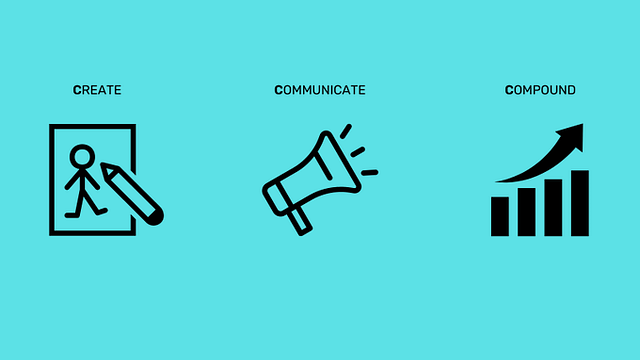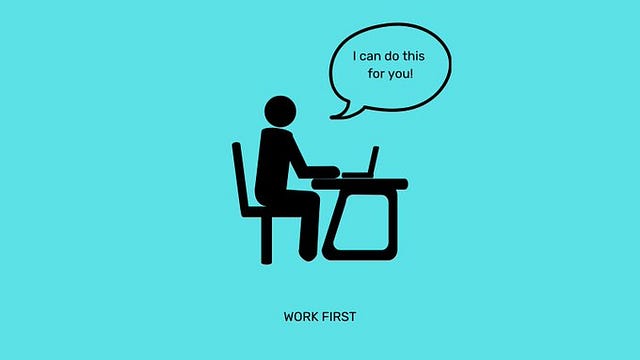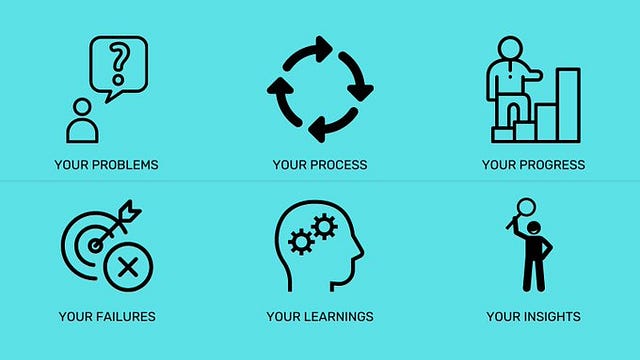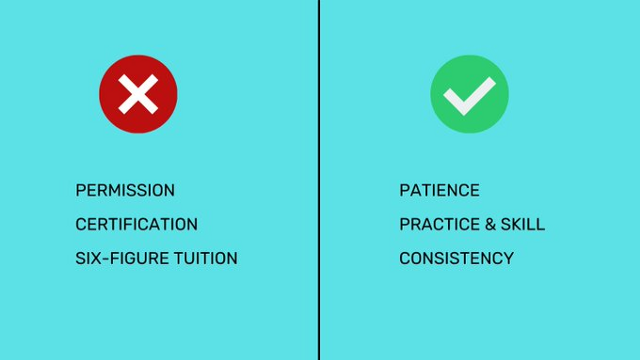The best jobs are neither decreed nor degreed. They are creative expressions of continuous learners in free markets. — Naval Ravikant
The internet has revolutionized the way talent is developed, discovered and deployed. The world is shifting away from traditional permanent roles to a job market that is characterized by short-term contracts and freelance work. If you want to learn the skills needed to thrive in this new market, but don’t have the necessary network or reputation to start, Permissionless Apprenticeship is the answer.
On the internet, no one cares about your degree
University degrees used to be a golden ticket to success, all you had to do was study hard, get a degree and a good job would be waiting for you. That worked when higher education was a rare feat and you were only competing with the people in your home town.
On the internet, you’re competing against a potential pool of 5 billion other users. Nowadays, degrees are like belly buttons, everyone’s got one, no one cares about your one and they don’t really serve a purpose once you’re out in the real world. Unless your job mandates a specific degree, it’s not much more than a piece of paper.
There is an upside to this though, employers now have access to more people than ever and you have access to more jobs than ever. You no longer have to put up half a decade’s earnings in advance to fund your education. Information is everywhere and access is no longer the problem. You can knock on any door you like, but having something valuable to offer is the key.
What is a Permissionless Apprentice?
An apprentice is defined as “a person who works for another to learn a trade”, ie. learning by doing. Most apprenticeships are in physical trades such as plumbing and carpentry. It’s obvious to most of us that fixing a sink is a better way to learn plumbing than watching a lecture on fixing a sink. But this logic can be applied and should be applied to most other jobs. I believe apprenticeship is precisely what the current job market demands.
A permissionless apprentice is simply an apprentice who doesn’t ask for permission, obviously! It’s someone who takes the initiative to learn through independent study and experimentation. Permissionless apprentices are driven by their own passion and curiosity. They may seek mentors to guide their learning, but don’t wait for the mentor’s approval to provide value. After all, the people/businesses we admire and want to work with are too busy doing the things we admire them for to notice us. So we have to lead with value.
How to be a permissionless apprentice: The 3Cs

Create

Creating value for others is the first and most important step. Instead of asking for permission to work on a project, you should develop ideas that add value to the project and implement them. Action is key! By creating value for others, you prove your skills and build a strong reputation in your field.
In the beginning, you won’t have any mentors. You can find some by first choosing what you want to learn and who you want to learn it from, then figuring out how you can help them and doing it. For example, you could build a website for your favourite writer and send it to them as a gift. If you’re a designer, you could create thumbnails for your favourite YouTuber’s videos and so on.
Communicate

The second core idea of permissionless apprenticeship is to show what you can do, rather than just telling people. Always show, don’t tell! A degree and CV are telling, a portfolio is showing. Showing how you created your portfolio is even better. But remember, no one cares what you can do, they only care about what you can do for them.
So what can you do for them?
• More attention on their work?
• Doing something you saw them ask for?
• Building them a tool that saves them time?
• Introducing them to someone that can help them?
• Showing them a specific untapped opportunity?
It’s important to document the whole process and not just your refined product, like in a traditional portfolio. Record the problems you came across. How did you use your skills to overcome them? What did you learn that will help you avoid having the same problems in the future?
Reflect on your work in public. By doing so, you demonstrate your skills and build a solid online presence. It also helps you to learn and improve, as you receive feedback and advice from others in your field. You also help other people who are a few steps behind you on the same journey so you’re providing value to another set of people without even trying.
In the age of Instagram, it’s easy to be apprehensive about sharing your work in progress. We only want people to see our best angle in the best lighting, but showing your process builds trust. The concept of “show your work” from your school days still holds true. While anyone can google or ChatGPT the answer, the ones who truly understand it will find long-term success. Sharing your work proves you understand what you’re doing.
Here are some ideas:
Writing? Blog about your process, and how you solve problems, tweet your best insights and write a newsletter that reflects on your progress each week.
Making things? Publish your permissionless projects, and document your work in progress. Use a portfolio site like Dribbble, or build your own.
Making videos? Build up a YouTube channel to document your process, reflect on your work in more detail, and/or expand on your writing.
Compound

At first, no one will see your work; if they do, they might not appreciate it. This can be discouraging. Don’t despair, you’re still winning because you’re getting better. You get faster, it gets easier, and you get more confident. Confidence comes from two things: Competence, and experience of putting yourself out there.
Most of us don’t start because we’re scared of what people will think. It’s called the spotlight effect; we’re the centre of our own world, so mistakenly believe we are the centre of everyone else’s world. A favourite quote of mine goes: “You’ll stop caring what people think about you when you realise how seldom they do.” Realising that no one is watching helps you get rid of the illusory spotlight. It doesn’t mean you’ve failed, it means you’re free to make mistakes and get better with each one.
If someone is watching, even better! The market/audience will tell you if your work is any good and the feedback will help you improve. The internet’s powerful network effect means getting in front of one of the right people can land you in front of hundreds more. When this strategy works, your work is amplified among the peer group of the person, business or industry you didn’t ask permission from in the first place.
You’ve now got several forms of proof of your skills.
Proof to yourself
You force yourself:
- To think
- To improve
Proof to the market
You force yourself:
- To publish
- To solve problems
- To build a portfolio of work
Everything you publish becomes an asset whose value is constantly compounding. If someone can read your essays, watch your videos, use your software, listen to your podcast, or read your tweets, your reputation builds globally, around the clock. Every time you repeat this process for a new project, you build another set of assets that will provide value long into the future.
This proof of work will function as leverage for winning new business. Someone else might be just as talented and skilled as you, but the person who has the proof of work/reputation that will get hired 9/10 times.
conclusion
Becoming a permissionless apprentice is a powerful way to learn and grow in any field. By focusing on creating value for others, building a personal brand, and showing your work, you can establish yourself as a serious player in your field. The internet has made it easier than ever to connect with others and showcase your skills, so there’s never been a better time to start. What are you waiting for?
Special thanks to SathyaHQ for the fantastic visuals and Jack Butcher for the ideas. Check out their Twitter profiles for more: @Jack Butcher @SathyaHQ







